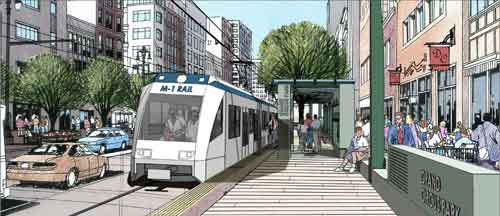From Crain’s Detroit Business:

The nonprofit M1 Rail effort said this week it tentatively plans to issue a request for proposals by no later than the end of October for streetcars to operate on the $137 million Woodward Avenue line in Detroit.
M1 CAO Heather Carmona told attendees at the Michigan Rail Conference in Lansing on Tuesday that the streetcar RFP is in the works, and that the goal is to have it issued by the end of October. An M1 spokesman later confirmed the RFP goal, and added that it could come sooner.
M1 executives in the past have told Crain’s they are looking at both off-the-shelf purchase of six streetcars or attaching themselves to another system’s order, which is a common practice in the transit industry because it can reduce turnaround time and cost.
Portland, Seattle, Tucson, Salt Lake City and Cincinnati are cities M1 had previously said it has looked at that have rail vehicle orders in process.
M1 didn’t provide any additional details about the RFP, so it’s unclear if interest in those systems remains.
M1 took a special interest in Cincinnati’s $20 million procurement of five streetcars for its $110 million plan to install a 3.8-mile downtown line using a blend of bonds, taxes and private donations. Groundbreaking on the project took place in February 2012, and the line is supposed to be running by 2014.
In April 2012, Cincinnati selected Elmira, N.Y.-based CAF USA, a subsidiary of Spain’s Construcciones y Auxiliar de Ferrocarriles S.A., as its preferred vendor to manufacture the five streetcars, with an option for up to 25 more cars. Delivery is expected to take 18 months.
Cincinnati’s streetcars are very similar to what Detroit is seeking.
The model used in an M1 report to the federal government was the Siemens S-70 Ultrashort, manufactured by Germany’s Siemens AG.
The cars are double-ended, with operating controls at both ends and passenger doors on either side, and are powered by aerial electrical lines.
The low-floor cars allow passengers to step directly onto the trams from elevated boarding platforms alongside the trains. Each seats 60 people, with room for 120 more standing.
The streetcars are expected to be powered, for at least a portion of the Woodward route, by aerial power lines over the vehicles.
Under “Buy America” requirements triggered by the use of federal money, the streetcars for the Detroit and Cincinnati projects must be at least 60 percent manufactured domestically.
Streetcars typically cost between $2 million and $6 million apiece, depending on size and options, and multi-vehicle orders usually include payment for spare parts and other ancillary costs.
The city of Tucson in 2010 gave Clackamas, Ore.-based manufacturer United Streetcar LLC a $26 million contract for seven 180-passenger streetcars to operate on its 3.9-mile, $196 million line known as the Sun Link. An eighth streetcar was added to the order last year for $3.6 million.
Streetcar RFP the latest contract move
The M1 streetcar RFP represents the latest step in a series of major contracts that will be awarded to make the light rail line a reality.
Other M1 project bids already awarded include San Francisco-based URS Corp. to do design work and Kansas City-based HNTB Corp. to act as owner’s representative on the project.
On July 30, Alameda, Calif.-based civil construction firm Stacy and Witbeck Inc., which has built 17 transit systems, was awarded the project’s construction manager and general contractor bids from a pool of five companies.
Detroit-based White Construction Co. has been subcontracted by Stacy and Witbeck to work on the project.
Because engineering is still underway, a maximum contract price hasn’t been determined for Stacy and Witbeck, M1 said.
Future M1 bids will include an estimated $9.5 million for construction of a vehicle storage and maintenance facility, and a contract for a private-sector vendor to operate and maintain the streetcar system at an estimated $5.5 million annually.
Work on Woodward is expected to begin this fall between Larned and Adams streets, and M1’s goal is to be operating by the fourth quarter of 2015.
M1’s plan is a mostly curbside-running, fixed-rail streetcar circulator system, co-mingled with traffic, with 11 stops between Grand Boulevard and Congress Street. It will run in the median at its north and south ends.
M1 Rail is a nonprofit using a blend of public and private funding to finance the rail line on 3.3 miles of Woodward Avenue.
The streetcar loop – with a predicted 3 million yearly users – will cost an estimated $5.1 million annually to operate, rising to $6.5 million by 2022, according to project organizers.
M1, which launched in 2007, has said it will endow a $10 million fund to operate and maintain the system for up to 10 years, until 2025, at which point the group plans to donate the project assets and operating responsibility to the regional transit authority.
M1 Rail is led by Penske Corp. founder Roger Penske and Quicken Loans Inc. founder Dan Gilbert, the project’s co-chairman; Peter Karmanos Jr., founder of Detroit-based Compuware Corp.; and the Ilitch family, owners of the Detroit Tigers, Detroit Red Wings and Little Caesar Enterprises Inc.
Major construction commitments of $3 million have been secured from Wayne State University, Quicken Loans, the Ilitch companies, Penske Corp., Compuware, Chevrolet, Chrysler Group, Blue Cross Blue Shield of Michigan, the Detroit Medical Center, Henry Ford Health System, Wayne County government, the Ford Foundation and the W.K. Kellogg Foundation. The Hudson Webber Foundation has pledged $1 million.
The $3 million commitments are for the display advertising rights to a station along the route. The Troy-based Kresge Foundation has pledged $35.1 million, part of which already has been spent, and it gave an additional $3 million as a “backstop” grant.
The Detroit Downtown Development Authority has earmarked $9 million for M1. Another $16 million is from federal New Market Tax Credits, which have to be sought annually. Plans also include a $22 million commercial loan.
